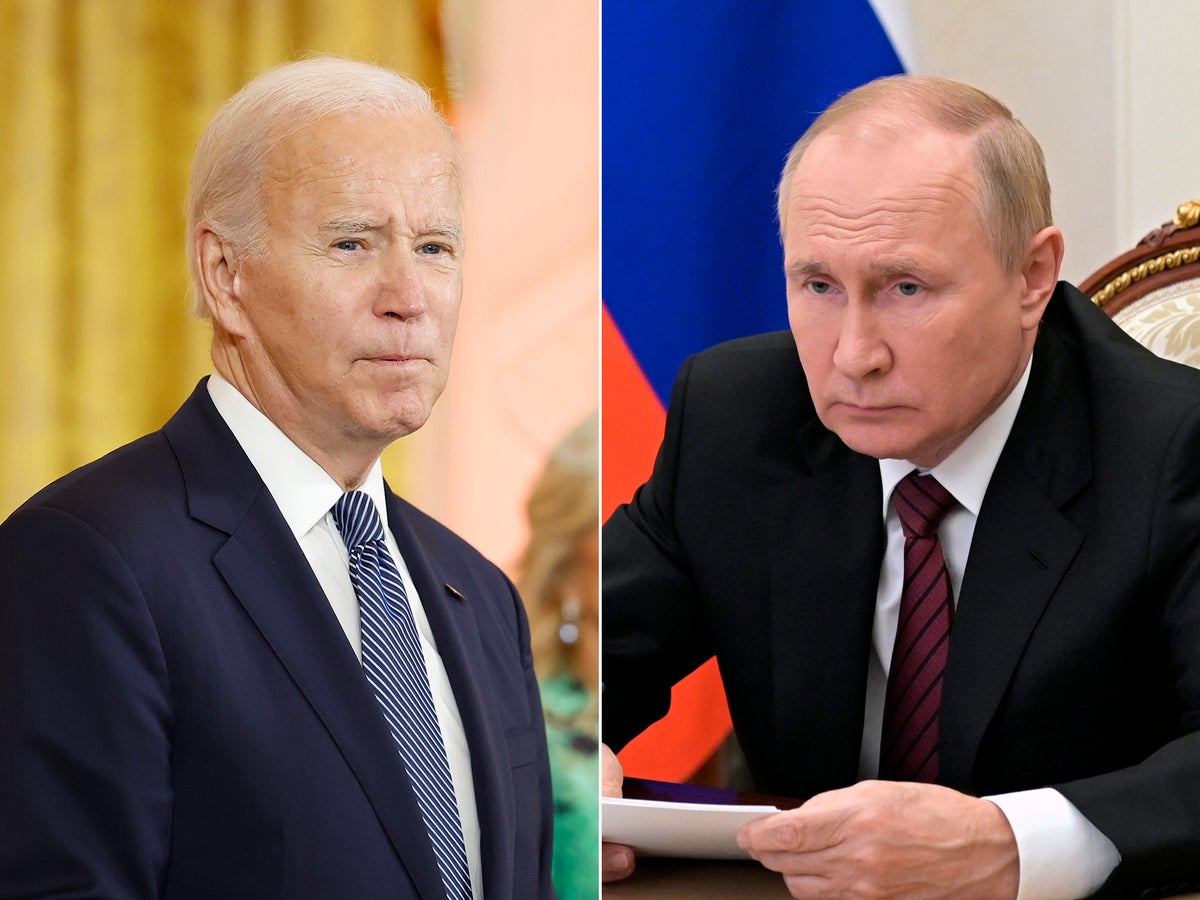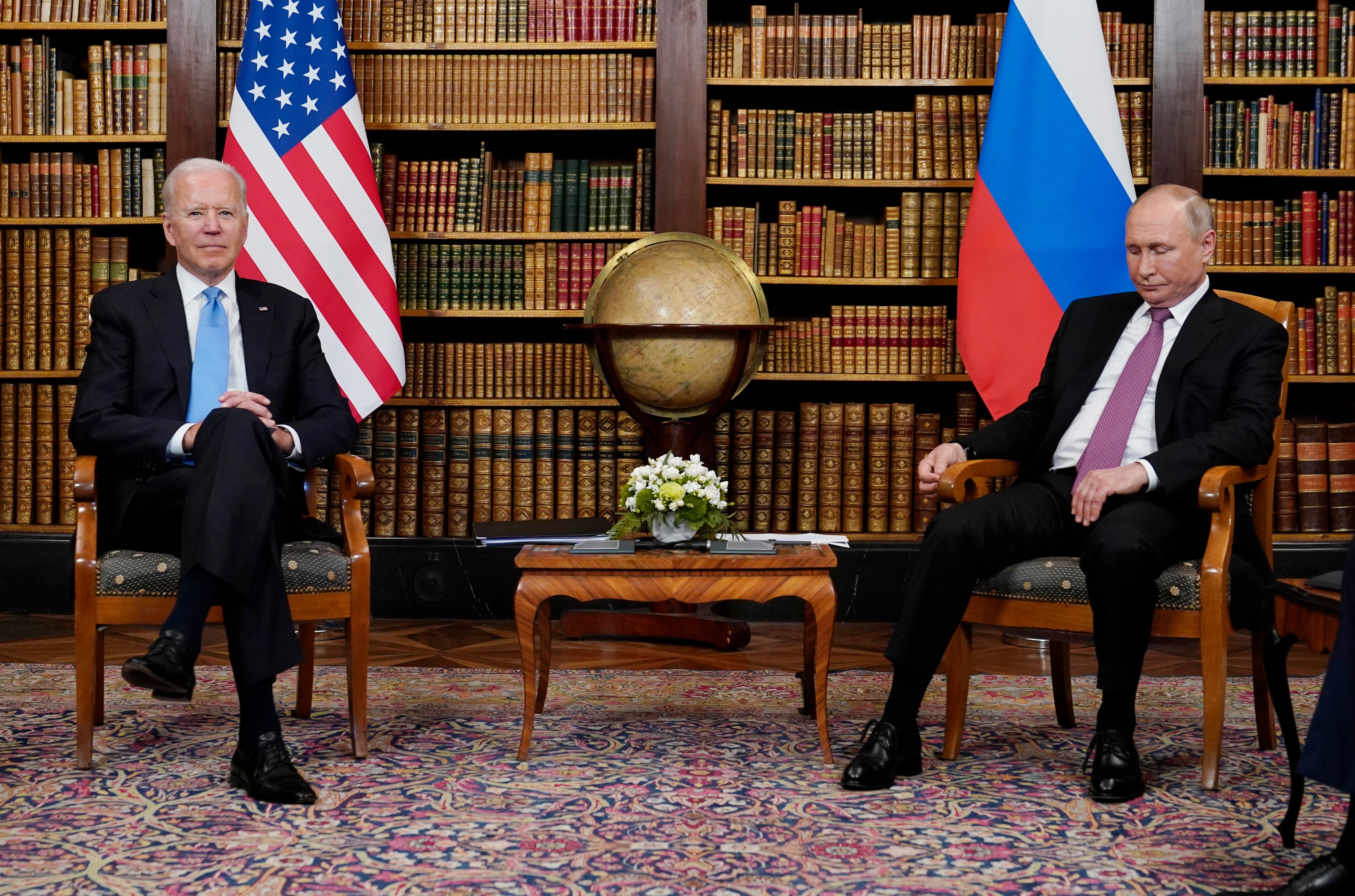
During Joe Biden’s surprise visit to Ukraine on Monday, a hugely significant gesture of solidarity with Kyiv ahead of the first anniversary of the Russian invasion, the American president could not resist taunting his Kremlin counterpart.
“When Vladimir Putin launched his invasion nearly one year ago, he thought Ukraine was weak and the West was divided. He thought he could outlast us. But he was dead wrong,” Mr Biden told the world during a bilateral appearance alongside Volodymyr Zelensky.
The Democrat may divide opinion at home but he was warmly welcomed in the Ukrainian capital, where the locals expressed appreciation for his unwavering support for their cause.
His track record of hostility towards Mr Putin, a fellow veteran Cold Warrior, also deserves to be remembered.
Commenting on Russia’s brutal war in Chechnya in February 2000, Mr Biden said of the country’s then acting-president that “the jury is still out on Mr Putin and his commitment to democratic rule or to nonproliferation… It is in our interest to remain closely engaged with Moscow, but if Mr Putin’s government strays too far from the democratic road, or purposely helps other countries to develop weapons of mass destruction, we must be prepared to re-evaluate our relationship”.
When George W Bush unwisely pronounced the Russian leader “very straightforward and trustworthy” after meeting him at a summit in Slovenia in June 2001, even claiming he had got “a sense of his soul”, it was the experienced senator for Delaware who again took a more sceptical line.
“I don’t trust Putin,” Mr Biden said in the meeting’s aftermath. “Hopefully, the president was being stylistic rather than substantive.”
He continued: “The president’s first meeting with Vladimir Putin appeared to be positive and constructive and a start for a new chapter in Russian-American relations. But I’d caution the administration against being excessively optimistic about Mr Putin and his intentions. Russia has exhibited a troubling pattern of less than democratic behaviour since Putin took office.”
In an interview with Chris Wallace on Fox News Sunday in December 2006, he again sounded the alarm over creeping authoritarianism in Eastern Europe, declaring: “Russia is moving more and more toward an oligarchy here. Putin is consolidating power. He’s been doing it for the last six years. I think that Russia is sliding further away from genuine democracy and a free-market system and more toward a command economy and the control of a single man.”
While that warning has been more than borne out by the events of the last decade, Mr Biden’s ascent to the White House as Barack Obama’s vice president meant the official US foreign policy line on Moscow was that it was time to start over.
“It’s time to press the reset button and to revisit the many areas where we can and should be working together with Russia,” Mr Biden said in February 2009, hoping to bring Mr Putin in from the cold for the sake of European unity six months on from the Russo-Georgian War over the sovereignty of South Ossetia and Abkhazia.
So far as that went, Mr Biden visited the Kremlin in 2011 and encountered Mr Putin in person.
Mr Biden remembered the encounter in conversation with The New Yorker in 2014 and said: “I had an interpreter, and when he was showing me his office I said, ‘It’s amazing what capitalism will do, won’t it? A magnificent office!’ And he laughed. As I turned, I was this close to him… I said, ‘Mr Prime Minister, I’m looking into your eyes, and I don’t think you have a soul.’”
Asked whether he had really said that, invoking President Bush’s naive remark, Mr Biden answered: “Absolutely, positively. And he looked back at me, and he smiled, and he said, ‘We understand one another.’ This is who this guy is!”
In the same interview, he reflected: “We no longer think in Cold War terms, for several reasons. One, no one is our equal. No one is close. Other than being crazy enough to press a button, there is nothing that Putin can do militarily to fundamentally alter American interests.”
Frostier relations with Russia returned over its annexation of the Crimea in 2014 and Mr Putin’s implausible denials that the “Little Green Men” fighting for Donetsk and Luhansk were Russia-backed.
Donald Trump’s tenure in the White House was of course dominated by suspicion of Russian election hacking and the possibility of Trumpworld collusion, the subject of FBI special counsel Robert Mueller’s investigations.
Mr Putin certainly enjoyed Mr Trump’s assertion at the Helsinki summit of July 2018 that he believed Russia’s denials over the expert opinion of his own intelligence services and, even more, the president’s blundering threat to withhold Congressionally-approved military funding for Mr Zelensky unless he launched a politically-charged investigation into Mr Biden’s son’s role on the board of Ukrainian gas company Burisma, events that led to his first impeachment.

Having entered the Oval Office himself on the other side of Covid-19 and the Capitol riot, Mr Biden told ABC’s George Stephanopoulos in March 2021 that he had spoken to Mr Putin himself about the election hacking question and told him: “I know you and you know me. If I establish this occurred, then be prepared.”
The president agreed that he considered the Russian “a killer” and said he would pay “a price” for his actions if they could be definitely substantiated.
Such talk did not stop the men meeting in person again in Geneva, Switzerland, the following June for what the American described as “constructive” talks on cybercrime, human rights and Ukraine.
“The bottom line is, I told President Putin that we need to have some basic rules of the road that we can all abide by,” Mr Biden said afterwards.
For his part, the Russian said: “He’s a balanced and professional man, and it’s clear that he’s very experienced. It seems to me that we did speak the same language.”
Matters were less cordial when the two spoke by Zoom in December 2021 as Mr Biden demanded answers as to why Russian forces were amassing on the country’s western border with Ukraine, with the prospect of a large-scale invasion widely feared.
Mr Biden’s top national security adviser, Jake Sullivan, said after the call that his boss had “told President Putin directly that if Russia further invades Ukraine, the United States and our European allies would respond with strong economic measures”.
The meeting was “useful” and the discussion “direct and straightforward,” according to Mr Sullivan, who added that there was “a lot of give and take” but “no finger wagging”.
Prior to the invasion actually happening, Western leaders like Emmanuel Macron and Olaf Scholz and US secretary of state Antony Blinken visited Moscow in the hope of dissuading Mr Putin from proceeding, their case made ultimately in vain.
Mr Biden had agreed “in principle” to make his own personal appeal but the trip never took place and the two have not met since, although they might have run into each other at the G20 summit in Indonesia last November had the Russian not pulled out and sent his foreign minister Sergey Lavrov instead.
The US and its Nato allies have meanwhile made good on their threats to impose biting economic sanctions on Russia while supporting Ukraine with humanitarian and military aid, leaving the Kremlin to regard their war in Ukraine as a savage fight with the West by proxy.
Relations between Washington and Moscow have not been so low since the Soviet Union was in its pomp, a period of tense nuclear standoff both Mr Biden and Mr Putin recall all too well.







